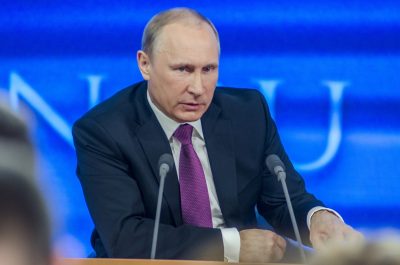Putin: If Finns, Swedes Get NATO ‘Military Infrastructure’, We’ll Respond

All Global Research articles can be read in 51 languages by activating the “Translate Website” drop down menu on the top banner of our home page (Desktop version).
To receive Global Research’s Daily Newsletter (selected articles), click here.
Visit and follow us on Instagram, Twitter and Facebook. Feel free to repost and share widely Global Research articles.
***
On May 16, just before I was interviewed for The Critical Hour, Putin addressed Finland’s and Sweden’s plans to join NATO, using words far milder than had most expected:
“Russia has no problems with these states. There is no direct threat to Russia in connection with NATO’s expansion to these countries.”
Then, the kicker:
“But the expansion of NATO’s military infrastructure to these territories will certainly evoke a response on our part. We will see what it will be like based on the threats that are created for us.”
So Who’s Already Got ‘NATO’s Military Infrastructure’?
The interview with The Critical Hour, provided an opportunity to underscore what the Russians seems to fear the most — the emplacement of what they call “offensive strike missiles” in sites near Russia’s border. In other words, THAT kind of “military infrastructure”. For several years Putin has complained that so-called “ABM” sites already completed in Romania and almost complete in Poland can be converted overnight into launchers for “offensive strike missiles” — Tomahawk cruise missiles, for example, and, later, hypersonic ones.
A major concern, of course, is warning time; that is, the shrinking minutes from the missile launch to target.
After Presidents Biden and Putin talked by telephone on Dec. 30, 2021, the Kremlin readout included this:
“Joseph Biden emphasized … that Washington had no intention of deploying offensive strike weapons in Ukraine.”
No one challenged that readout at the time. Does anyone know why/how that that key point made by Biden fell into the cracks? We are talking here about one president’s direct personal assurance to the other. The key role played by trust (or distrust) can hardly be exaggerated.
The following short video clip from 2015 provides a sense of how frustrated Putin has been, in trying to get people (in this case Western journalists) to put themselves in his shoes. You may wish to click on the two-and-a-half minute segment — from minute 10:20 to 12:55 — at the following link.
Erdogan Opposed to Finland, Poland in NATO
It takes a unanimous vote by all 30 NATO countries to accept new members. So one big question is whether Turkey’s President Erdogan will relent and acquiesce in Finland and Poland joining the alliance. Hard to predict, but my guess is that NATO will sweeten the pot enough for Erdogan that he will let himself be bought off. I referred the interviewers to a Tweet I had posted earlier in the day, suggesting that, even though Turkey once faced down the U.S. (on Iraq), I would not bet much on Erdogan facing down the immense pressure on this one. But who knows?
Will Turkey’s Erdogan be bought off on Finland & Sweden membership in NATO? 19 yrs ago when Turkey saw the US/UK March of Folly into Iraq for what it was, it summoned the guts to say NO to an axis of attack from the north. Smart money says he’ll let himself be seduced this time.
— Ray McGovern (@raymcgovern) May 16, 2022
*
Note to readers: Please click the share buttons above or below. Follow us on Instagram, Twitter and Facebook. Feel free to repost and share widely Global Research articles.
Featured image is from Notes from the Twilight Zone

